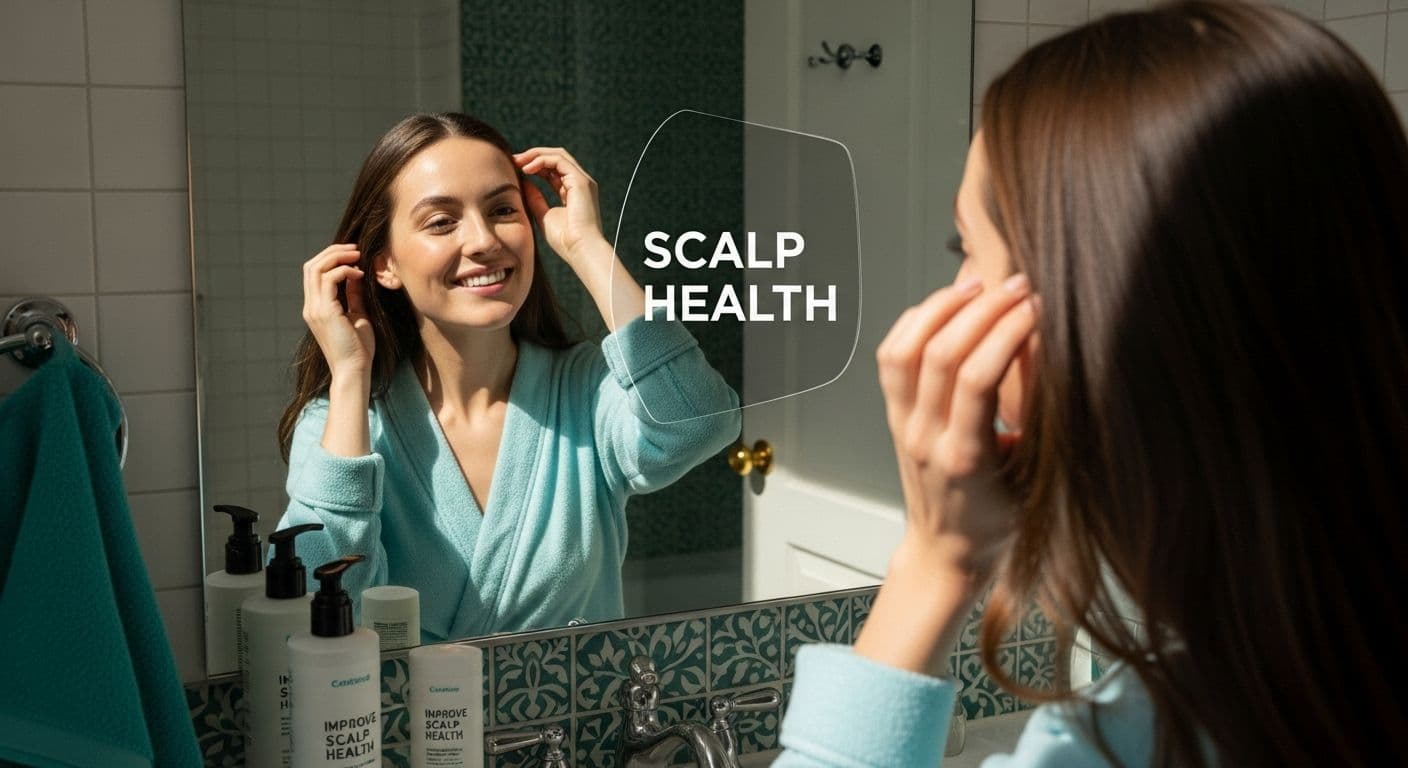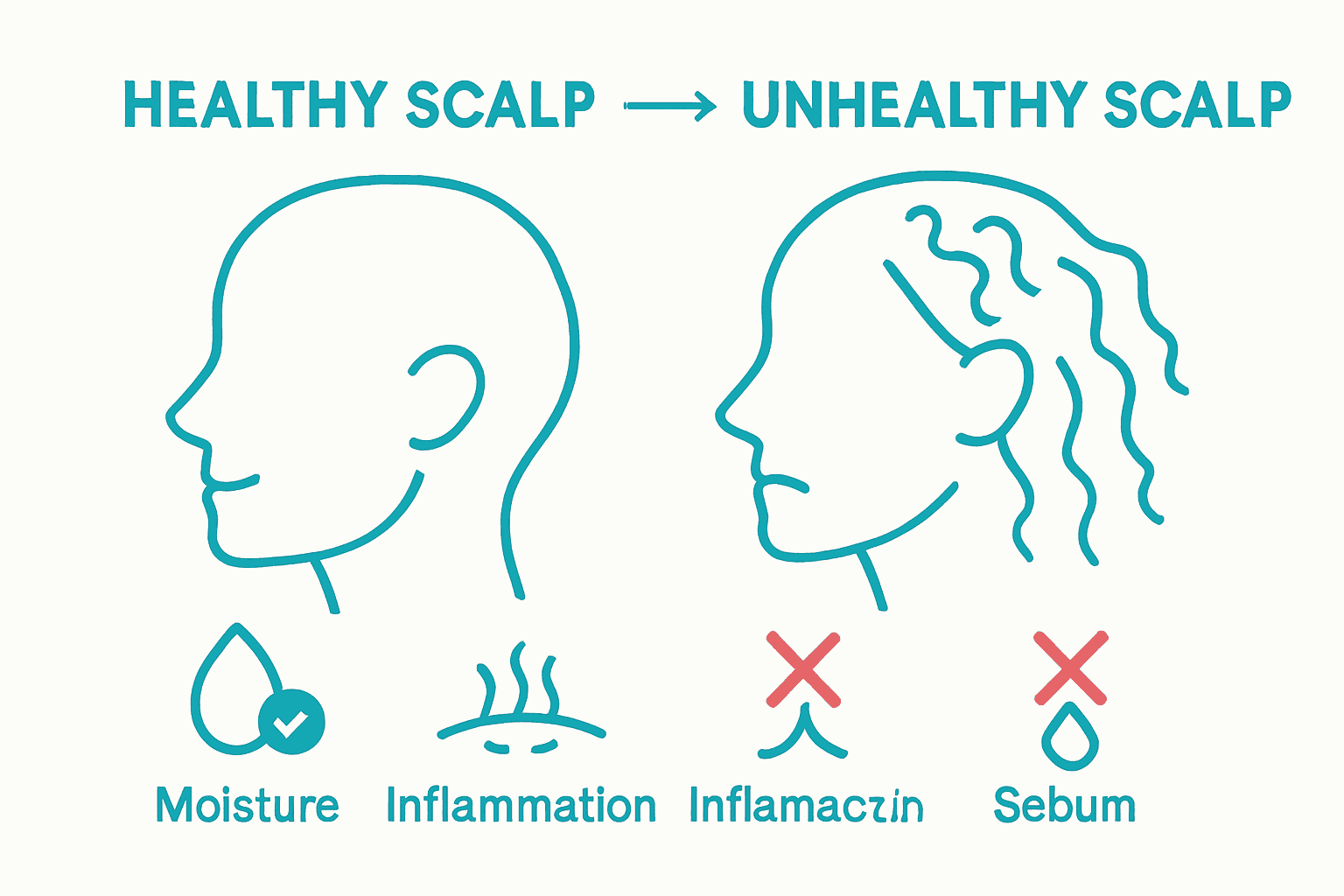Blog
Learning Materials
Understanding How to Improve Scalp Health Effectively
Updated: September 6, 2025

Scalp health controls so much more than most realize. Experts found that imbalances on your scalp can trigger hair thinning, inflammation, and even signal hidden health issues. Most people obsess over shampoos and serums, but skip what actually matters for stronger, fuller hair. The real secret sits beneath the surface and shapes your hair from the root up.
Table of Contents
- What Is Scalp Health And Why Is It Important?
- How Scalp Conditions Affect Hair Growth And Overall Health
- Key Factors Influencing Scalp Health: Nutrition And Lifestyle
- Natural Remedies And Treatments That Support Scalp Wellness
- The Role Of Personalized Care In Enhancing Scalp Health
Quick Summary
| Takeaway | Explanation |
|---|---|
| Scalp health is critical for hair quality. | A healthy scalp fosters stronger hair growth and prevents issues like thinning or premature loss. |
| Nutrition directly impacts scalp wellness. | Key nutrients such as protein, omega-3s, and vitamins are essential for maintaining scalp and hair health. |
| Manage scalp conditions to prevent hair loss. | Issues like dandruff or inflammation disrupt hair growth, making timely treatment crucial. |
| Personalized care optimizes scalp health. | Tailored treatment plans based on individual scalp analysis enhance effectiveness in addressing specific concerns. |
| Use natural remedies for scalp support. | Botanical oils and herbal treatments can provide therapeutic benefits for maintaining scalp health effectively. |
What is Scalp Health and Why is it Important?
Scalp health represents a critical yet often overlooked aspect of overall hair wellness that goes far beyond simple surface appearance. At its core, scalp health refers to the physiological condition of the skin covering your head, which plays a fundamental role in hair growth, strength, and quality.
Understanding the Scalp's Ecosystem
The scalp is a complex biological environment hosting numerous microorganisms, sebaceous glands, and hair follicles. According to research from the National Library of Medicine, a balanced scalp ecosystem determines hair growth potential and prevents potential complications.
Key characteristics of a healthy scalp include:

- Balanced moisture levels
- Minimal inflammation
- Optimal sebum production
- Absence of persistent itching or scaling
- Strong hair follicle foundation
The Critical Connection Between Scalp and Hair Quality
A compromised scalp directly impacts hair growth and quality. When the scalp experiences persistent issues like excessive dryness, oiliness, or microbial imbalances, it can lead to significant problems such as hair thinning, premature hair loss, and reduced hair strength.
Moreover, scalp health influences more than aesthetics. It reflects broader health indicators, potentially signaling underlying nutritional deficiencies, hormonal changes, or potential dermatological conditions. For those interested in comprehensive hair care, understanding scalp dynamics becomes crucial for maintaining robust hair growth and preventing potential issues.
Managing scalp health requires a holistic approach that considers individual factors like genetics, lifestyle, diet, and environmental exposures. By prioritizing scalp wellness, individuals can create an optimal environment for healthy, vibrant hair growth.
How Scalp Conditions Affect Hair Growth and Overall Health
Scalp conditions can dramatically impact not just hair appearance, but also overall hair health and growth dynamics. Understanding these intricate relationships helps individuals proactively manage their hair and prevent potential long-term complications.
The Biological Impact of Scalp Disorders
Unhealthy scalp environments create significant disruptions in normal hair growth cycles. According to research from the National Institutes of Health, persistent scalp conditions generate oxidative stress that directly interferes with hair follicle function and keratin production.
Critical scalp disorders that impede hair growth include:
- Seborrheic dermatitis
- Psoriasis
- Fungal infections
- Chronic dandruff
- Folliculitis
Mechanisms of Hair Growth Disruption
Scalp conditions interrupt hair growth through multiple biological mechanisms. Inflammation reduces blood circulation to hair follicles, limiting nutrient delivery and oxygen supply. This compromises the follicle's ability to generate strong, healthy hair strands. Additionally, persistent scalp issues can trigger premature hair cycling, leading to increased shedding and potential long-term hair thinning.
For individuals experiencing consistent scalp challenges, understanding hair growth dynamics becomes crucial in developing targeted treatment strategies. By addressing underlying scalp conditions, one can potentially reverse negative growth patterns and restore optimal hair health.
Ultimately, scalp health represents a complex interplay of biological factors that extend far beyond cosmetic concerns. Proactive management, early intervention, and comprehensive understanding of these intricate systems can significantly improve overall hair wellness and prevent potential long-term hair loss complications.
Key Factors Influencing Scalp Health: Nutrition and Lifestyle
Scalp health extends far beyond surface-level care, deeply intertwining with our nutritional intake and lifestyle choices. Understanding these interconnected factors provides a comprehensive approach to maintaining optimal scalp wellness and preventing potential hair health complications.
Nutritional Foundations of Scalp Health
Nutrition plays a pivotal role in supporting scalp and hair follicle function. According to research from the International Journal of Trichology, specific nutrients directly impact hair growth and scalp condition.
Key nutritional elements essential for scalp health include:
- Protein for keratin production
- Omega-3 fatty acids for inflammation reduction
- Zinc for cellular repair
- Vitamin D for follicle stimulation
- Iron for oxygen transportation
Lifestyle Factors Impacting Scalp Wellness
Lifestyle choices significantly influence scalp health through physiological mechanisms. Chronic stress, inadequate sleep, and environmental exposures can trigger hormonal imbalances and inflammatory responses that compromise scalp integrity. Smoking, excessive alcohol consumption, and sedentary behaviors further exacerbate these negative impacts.
For individuals seeking comprehensive scalp management, exploring dietary strategies becomes crucial in developing holistic wellness approaches. By understanding the intricate relationship between nutrition, lifestyle, and scalp health, individuals can implement targeted interventions to support robust hair growth and prevent potential scalp disorders.
The table below summarizes key nutrients and their specific roles in supporting scalp health, as discussed in the article.
| Nutrient | Role in Scalp Health | Example Function |
|---|---|---|
| Protein | Builds keratin and strengthens follicles | Supports hair structure |
| Omega-3 Fatty Acids | Reduces inflammation | Soothes scalp irritations |
| Zinc | Aids cellular repair | Supports scalp healing |
| Vitamin D | Stimulates follicle activity | Encourages new hair growth |
| Iron | Delivers oxygen to scalp cells | Prevents excessive shedding |
Ultimately, scalp health represents a dynamic interplay of internal and external factors. Proactive nutrition, stress management, regular exercise, and mindful lifestyle choices can create a foundation for optimal scalp wellness and sustained hair health.

Natural Remedies and Treatments That Support Scalp Wellness
Natural remedies offer powerful, holistic approaches to supporting scalp health without relying solely on synthetic treatments. These plant-based solutions leverage centuries of traditional knowledge and emerging scientific research to address various scalp conditions and promote optimal hair growth.
Botanical Oils and Their Therapeutic Properties
Certain natural oils have demonstrated remarkable potential in supporting scalp wellness. According to research examining herbal remedies, botanical extracts can provide multiple therapeutic benefits for scalp and hair health.
Key natural oils with significant scalp health benefits include:
- Coconut oil for moisturizing and antimicrobial protection
- Rosemary oil for stimulating blood circulation
- Tea tree oil for combating fungal infections
- Argan oil for reducing inflammation
- Jojoba oil for balancing sebum production
Herbal Treatments and Their Mechanism of Action
Herbal treatments work through complex biological mechanisms that support scalp health. These natural compounds interact with hair follicles, modulate inflammatory responses, and provide essential nutrients directly to the scalp environment. Many herbs contain antioxidants and bioactive compounds that can help reduce oxidative stress and support cellular regeneration.
For those interested in comprehensive natural scalp care, exploring herbal solutions can provide targeted strategies for addressing specific scalp concerns. By understanding the intricate ways these natural remedies function, individuals can develop more personalized and holistic approaches to scalp wellness.
Ultimately, natural remedies represent a nuanced approach to scalp health that considers the interconnected nature of biological systems. Integrating these treatments requires careful consideration of individual scalp conditions, potential allergies, and overall health status.
This table compares common botanical oils highlighted in the guide, outlining their primary benefits and uses for scalp wellness.
| Botanical Oil | Primary Benefits | Typical Use on Scalp |
|---|---|---|
| Coconut Oil | Moisturizing, antimicrobial | Hydrates dry scalp |
| Rosemary Oil | Boosts circulation | Supports hair growth |
| Tea Tree Oil | Antifungal, soothing | Treats dandruff, calming effect |
| Argan Oil | Reduces inflammation | Nourishes and soothes |
| Jojoba Oil | Balances sebum production | Controls oiliness or dryness |
The Role of Personalized Care in Enhancing Scalp Health
Personalized care represents a revolutionary approach to scalp health, moving beyond traditional one-size-fits-all solutions. By recognizing the unique biological landscape of each individual's scalp, personalized treatments can address specific concerns with unprecedented precision and effectiveness.
The Science Behind Personalized Scalp Analysis
Advanced diagnostic techniques have transformed our understanding of scalp health. According to groundbreaking research in personalized scalp care, artificial intelligence and machine learning now enable incredibly detailed assessments of individual scalp conditions.
Key elements of personalized scalp analysis include:
- Detailed skin microbiome mapping
- Genetic predisposition screening
- Comprehensive environmental factor evaluation
- Precise moisture and oil level measurements
- Individual hair follicle health assessment
Technological Innovations in Scalp Care Customization
Technology has dramatically enhanced our ability to create targeted scalp health interventions. Advanced algorithms can now analyze multiple data points including genetic markers, lifestyle factors, environmental exposures, and individual physiological characteristics to develop highly specific treatment protocols.
For individuals seeking comprehensive scalp management, exploring personalized diagnostic tools can provide transformative insights into scalp wellness. By leveraging cutting-edge technologies, people can now receive treatment recommendations that are as unique as their individual biological fingerprint.
Ultimately, personalized scalp care represents more than just a technological innovation. It embodies a holistic approach that recognizes the complex, interconnected nature of individual health, emphasizing precision, prevention, and proactive management of scalp conditions.
Take Your Scalp Health Further with Personalized Solutions
Struggling with dryness, itchiness, or unpredictable hair growth? If this article on improving scalp health sounds familiar, you are not alone. Many people feel frustrated by visible scalp issues and the uncertainty of what will actually work for their unique scalp ecosystem. The truth is, real progress comes from targeting the root causes—like inflammation, imbalance, and nutrition—using precise insights. With MyHair.ai, you do not have to guess anymore.

Why wait for problems to worsen when you can get a complete picture of your scalp right now? Discover your current hair and scalp health with our AI-powered scan. Get data-driven advice, personalized product suggestions, and easy tracking as your scalp improves. Take the next step toward healthier hair by signing up at https://myhair.ai. Want to dive deeper into how custom analysis works? Check out how we use AI-based scalp analysis and recommendations to help you succeed. Your path to stronger hair and a healthier scalp starts today—act now for visible results.
Frequently Asked Questions
How can I improve my scalp health at home?
To improve scalp health at home, start by maintaining a balanced diet rich in essential nutrients like protein, omega-3 fatty acids, zinc, vitamin D, and iron. Regularly massage your scalp to stimulate blood circulation, and consider using natural oils like coconut or jojoba oil to moisturize and balance sebum production. It's also important to maintain proper hygiene and address any underlying scalp conditions.
What role does nutrition play in scalp health?
Nutrition plays a crucial role in scalp health as it provides the essential nutrients needed for hair follicle function and growth. Proteins support keratin production, while vitamins and minerals like zinc and iron help with cellular repair and oxygen transport. A diet deficiency in these nutrients can lead to scalp issues and negatively affect hair quality.
What natural remedies can I use to promote scalp health?
Natural remedies such as coconut oil, rosemary oil, tea tree oil, and argan oil can promote scalp health. Each of these oils has unique benefits; for instance, coconut oil helps with moisturizing and has antimicrobial properties, while tea tree oil combats fungal infections. Incorporating these into your hair care routine can enhance scalp wellness.
How can scalp conditions affect hair growth?
Scalp conditions can significantly disrupt hair growth by creating an unhealthy environment. Issues like inflammation, microbial imbalances, and excessive sebum can reduce blood flow to hair follicles, limiting the delivery of nutrients and oxygen. This can lead to hair thinning, premature shedding, and potentially long-term hair loss.